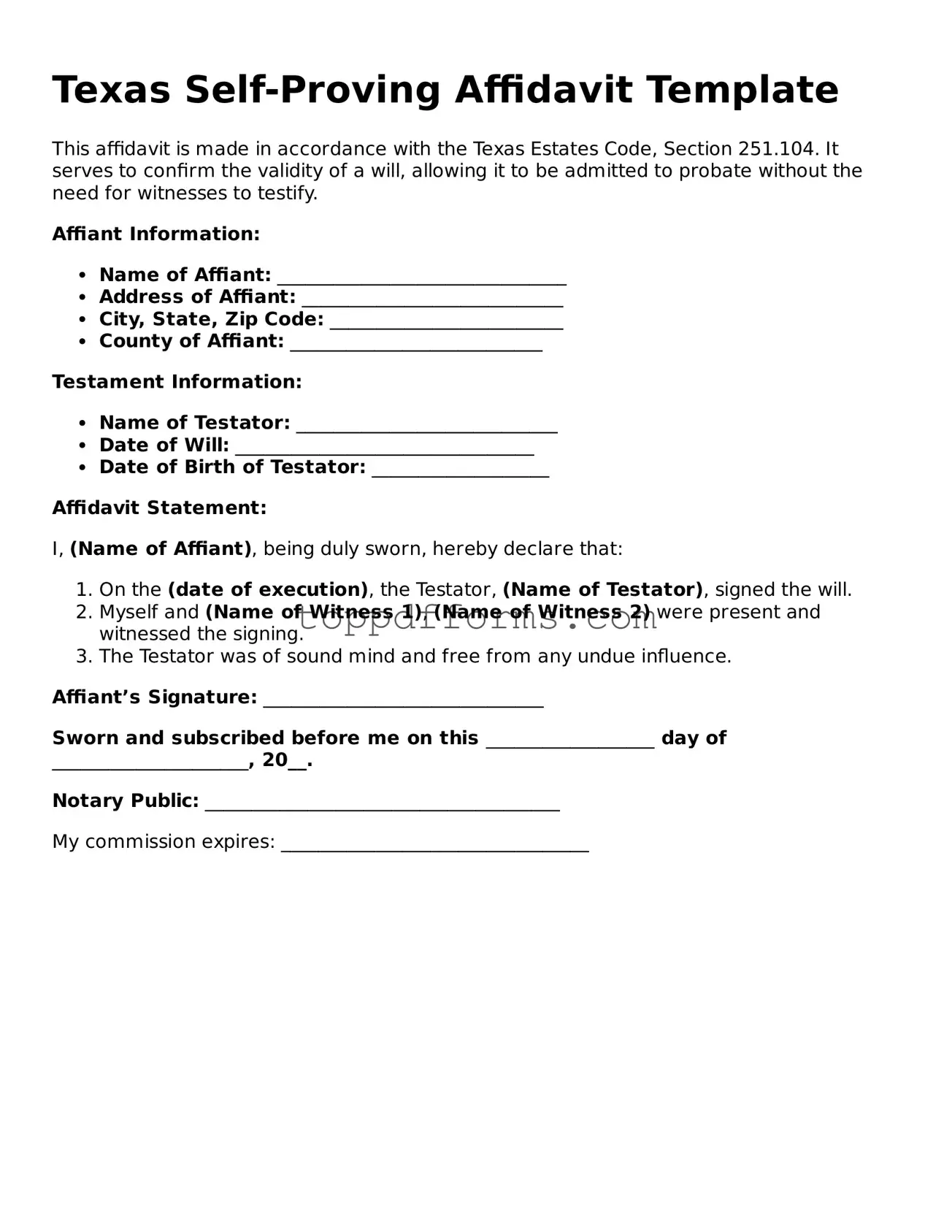Self-Proving Affidavit Document for Texas State
Things You Should Know About This Form
What is a Texas Self-Proving Affidavit?
A Texas Self-Proving Affidavit is a legal document that allows a will to be validated without requiring the witnesses to appear in court. This affidavit is typically attached to the will and serves as evidence that the will was properly executed. By using this form, the testator (the person who created the will) and the witnesses affirm that they signed the will voluntarily and that the testator was of sound mind at the time of signing. This process simplifies the probate process, making it more efficient and less burdensome for the heirs.
Who can create a Self-Proving Affidavit in Texas?
In Texas, any testator who has executed a valid will can create a Self-Proving Affidavit. The testator must be at least 18 years old and of sound mind. Additionally, the affidavit must be signed by the testator and at least two witnesses. These witnesses should not be beneficiaries of the will to avoid any potential conflicts of interest. It’s essential that all parties understand the implications of the document they are signing, as it plays a crucial role in the probate process.
What are the benefits of using a Self-Proving Affidavit?
The primary benefit of a Self-Proving Affidavit is the streamlining of the probate process. When a will includes this affidavit, it eliminates the need for witnesses to testify about the will's validity in court, saving time and reducing costs. Additionally, it provides a layer of protection against challenges to the will, as the affidavit serves as a sworn statement of the will's execution. This can offer peace of mind to both the testator and their loved ones, knowing that the will can be probated more smoothly.
How do I properly execute a Self-Proving Affidavit?
To properly execute a Self-Proving Affidavit in Texas, you must follow a few key steps. First, ensure that your will is signed by you and at least two witnesses. Next, have those witnesses sign the Self-Proving Affidavit in your presence. The affidavit should include specific language affirming that the will was executed in accordance with Texas law. It’s advisable to consult with a legal professional to ensure that all requirements are met and that the document is properly formatted. Once completed, this affidavit should be kept with the original will.
Can a Self-Proving Affidavit be revoked or changed?
PDF Overview
| Fact Name | Description |
|---|---|
| Purpose | The Texas Self-Proving Affidavit allows a will to be validated without the need for witnesses to testify in court. |
| Governing Law | This form is governed by Texas Estates Code, Section 251.104. |
| Requirements | The affidavit must be signed by the testator and two witnesses in the presence of each other. |
| Benefits | Using this affidavit can expedite the probate process and reduce potential disputes over the will's validity. |
Common mistakes
Filling out the Texas Self-Proving Affidavit form can be straightforward, but mistakes can happen. One common error is not signing the form in front of a notary. The affidavit must be signed by the testator and the witnesses in the presence of a notary public. If this step is skipped, the affidavit may not be valid.
Another mistake is failing to include all required information. Each section of the form has specific details that need to be filled out. Omitting information, such as the names or addresses of the witnesses, can lead to complications later on.
People often forget to check the dates. The affidavit must be dated when it is signed. If the date is missing or incorrect, it could raise questions about the validity of the document.
Using the wrong version of the form is another issue. Texas law may change, and it’s essential to use the most current version of the Self-Proving Affidavit. Using an outdated form can lead to legal problems.
Some individuals may not understand the importance of having two witnesses. The law requires that the affidavit be signed by at least two witnesses who are not beneficiaries. Failing to include two qualified witnesses can invalidate the affidavit.
Additionally, not reviewing the completed form for errors is a frequent oversight. Simple mistakes, such as typos or incorrect information, can cause delays or issues during the probate process. It’s wise to double-check everything before submitting.
Lastly, misunderstanding the purpose of the affidavit can lead to confusion. The Self-Proving Affidavit is meant to simplify the probate process. If individuals do not grasp its significance, they may not complete it correctly or at all.
Other Common State-specific Self-Proving Affidavit Forms
Free Florida Affidavit Template - This legal framework can significantly reduce the likelihood of costly probate disputes.
Utilizing a Release of Liability form is an essential step for individuals and organizations to mitigate risks associated with various activities, and you can find a comprehensive template to get started at PDF Templates, ensuring that you are well-prepared and legally protected.
New York Will Requirements - This form reinforces the legitimacy of the will, providing a clear declaration of intent that can be referenced in legal matters.
